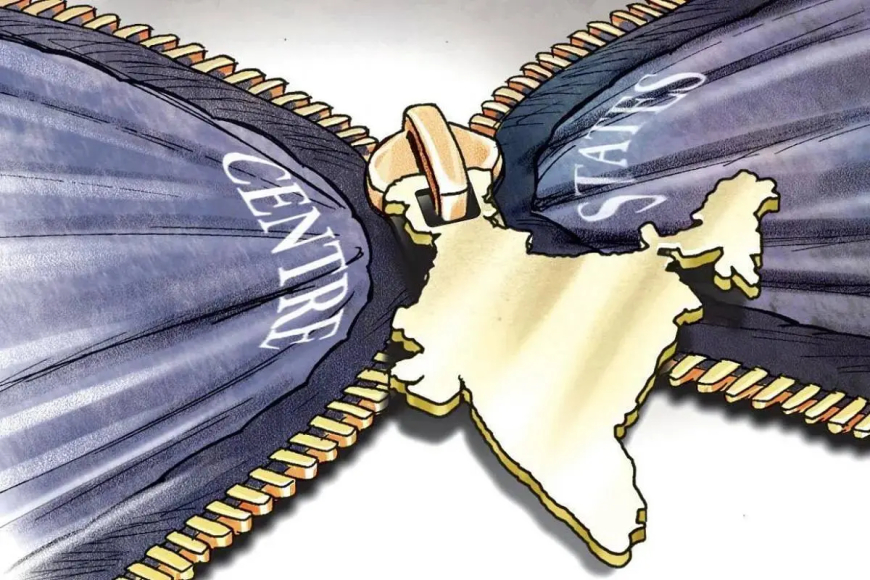The Debate on Decentralization: Centre vs. State Power Dynamics
The debate on decentralization centers on the power dynamics between central and state governments. Proponents argue it enhances democracy and local governance, while opponents warn of fragmentation and inefficiency. This discussion explores historical contexts and contemporary challenges, emphasizing the implications for effective governance.

India's ongoing debate over decentralization—particularly the balance of power between the Centre and the States—has again taken center stage in light of recent conflicts, such as those surrounding the Delhi Services Ordinance. These power dynamics touch upon fundamental questions of governance, autonomy, and the rights of states to administer their territories without undue interference. A libertarian perspective provides a unique lens through which we can examine these issues, highlighting the importance of limited central control and increased local autonomy.
Historical Context of Centralization in India

The history of centralization in India began during colonial times. Under British rule, power was highly centralized to facilitate effective control over the diverse subcontinent. This legacy of centralized authority continued post-independence, as the newly formed government adopted a federal structure that, while constitutionally defined, has consistently leaned towards central dominance. The architects of modern India were understandably cautious; they prioritized national unity and integrity in a country that was linguistically, culturally, and regionally fragmented.
However, over the decades, the drive to maintain cohesion has often led to an imbalance that favors the central government at the expense of state autonomy. This imbalance is evident in the proliferation of centrally-driven policies and the use of tools like Article 356, which allows the Centre to dismiss state governments. For libertarians, these interventions underscore a problem of systemic overreach—an issue that persists today and requires remedying to ensure true federal governance.
Constitutional Structure of Centre-State Relations

India’s Constitution, particularly through the Union, State, and Concurrent Lists, attempts to clearly delineate powers between the Centre and the states. These lists were intended to ensure a separation of responsibilities, allowing states autonomy in local matters while preserving the Centre’s role in national affairs.
However, the Concurrent List has been the site of repeated disputes, as both the Centre and states share jurisdiction over these areas. In practice, the Centre has often asserted its authority even in matters that should be of primary concern to states. The recent tussle over the Delhi Services Ordinance underscores this issue, with the Centre encroaching on administrative functions that impact the day-to-day governance of Delhi, thereby blurring the intended boundaries.
Recent Tussles Between Centre and State: Delhi Services Ordinance
The Delhi Services Ordinance, passed by the Centre, effectively stripped the elected government of Delhi of its authority over civil servants. This means that decisions about transfers, appointments, and postings in Delhi’s bureaucracy are now controlled by the central government. For the elected representatives of Delhi, who are responsible to their electorate, this lack of control over the administrative apparatus represents a significant curtailment of their ability to govern effectively.
From a libertarian viewpoint, this is problematic on multiple levels. First, it disrupts the principle of subsidiarity—that governance should occur at the most local level possible. Second, it reduces accountability; if the state government lacks the authority to manage its civil servants, then citizens have fewer avenues through which to influence their governance. A libertarian framework would argue for reversing this centralization, returning control to those directly accountable to the people.
Libertarian Perspective on State Autonomy
Libertarians emphasize minimizing government overreach and maximizing individual freedoms, often advocating for governance structures that are closest to the people—preferably local or municipal governments. In the context of India, a libertarian solution would be to decentralize power further from the Centre to the states and even to local municipalities. The fundamental principle here is that local governments are better positioned to understand and cater to the unique needs of their populations.
For example, by allowing states like Delhi greater autonomy, not only can governance become more responsive and efficient, but it also ensures that policies reflect the specific needs and preferences of the local population rather than imposing a one-size-fits-all approach from a distant central authority.
The Problems of Excessive Centralization
Centralized governance comes with significant drawbacks. Excessive centralization often leads to a detachment of policy-making from ground realities. The Centre may be unaware of local challenges, leading to inefficient or misdirected interventions. It also creates bottlenecks, as decisions that could be handled more effectively at the state level must first pass through central authorities, delaying the implementation of crucial measures.
The Delhi Services Ordinance is a pertinent example of the negative impact of central overreach. When decisions that directly affect local governance are made at the central level, it leads to inefficiencies and a sense of disenfranchisement among local leaders and the electorate. For libertarians, this is a critical issue—the more centralized a government becomes, the less it tends to understand the diverse needs of its populace.
Federalism Under Pressure: Case Study of Delhi

Delhi is an interesting case in point. Although it is the national capital, Delhi also functions as a quasi-state with an elected government. However, its unique status has resulted in an ongoing tussle between the Centre and the Delhi government. The recent ordinance highlights how federalism can come under pressure when the Centre decides to exert greater control, overriding the autonomy of a local administration.
The libertarian view here is that by reducing central interference, the city-state of Delhi could operate more efficiently and in line with the specific requirements of its citizens. The idea is to prevent power from accumulating at the Centre, which tends to lead to inefficiencies and bureaucratic hurdles.
The Advantages of Greater Decentralization

Greater decentralization brings several advantages. States and local governments, when given the freedom to function independently, can innovate and tailor policies to suit their constituents better. It fosters a sense of ownership among the citizens as they feel their representatives have real power to effect change.
International examples also illustrate the advantages of decentralization. In countries like Switzerland and the United States, a high degree of local governance autonomy allows regions to compete, innovate, and provide services that best match the needs of their residents. This competition creates a virtuous cycle of innovation and service improvement, something that India could benefit from if more power were devolved to states and municipalities.
Role of the Judiciary in Centre-State Conflicts

The judiciary has frequently stepped in to mediate disputes between the Centre and the states, with the Supreme Court often being the final arbiter. In the case of the Delhi Services Ordinance, for instance, the judiciary's role was pivotal in determining the limits of the Centre’s power over the state’s administrative machinery.
However, relying on the judiciary to resolve such disputes points to an inherent flaw in the system: the ambiguity and overreach of central power. A libertarian approach would argue for clearer constitutional provisions that inherently limit central interference, reducing the need for judicial intervention and allowing states to govern more autonomously.
Economic Impacts of Central Overreach

Excessive centralization can also negatively impact economic development. When states have the authority to manage their resources and craft economic policies suited to local contexts, they can attract investment, innovate, and generate employment more effectively. The principle of competitive federalism, which libertarians strongly support, allows states to act as laboratories for economic policies, leading to overall national growth.
States with greater economic independence are in a better position to experiment with policies, adapt swiftly to changing circumstances, and attract both domestic and foreign investment. In contrast, when economic power is centralized, bureaucratic delays and a lack of localized insights can hinder effective policy implementation and economic growth.
A Libertarian Solution: Reducing Central Control

Libertarians argue for a significant reduction in the central government's powers, advocating instead for localized governance where decisions are made as close to the citizens as possible. A potential solution for India involves a comprehensive re-evaluation of the Concurrent List and greater empowerment of states over matters that directly impact their populations.
India's diverse cultural, economic, and social landscape means that states need the freedom to tailor policies to their unique situations. A libertarian approach would involve reforming taxation so that states have greater fiscal independence, restructuring laws that allow the Centre to interfere in state governance, and redefining the boundaries of administrative control to ensure that local governments are genuinely empowered.
The Principle of Localized Governance
Localized governance is at the core of libertarian ideology. By ensuring that decisions are made by those who are most familiar with local conditions, not only is governance likely to be more efficient, but it also enhances accountability. Citizens can see the direct impact of policies and have a clearer line of influence over those who make decisions.
In India, pushing for municipal and village-level autonomy could significantly improve service delivery, as these local bodies are directly involved with the day-to-day issues of citizens. Empowering these institutions, and limiting the Centre’s role to broader, cross-state and national issues, would make governance more responsive and aligned with citizens’ needs.
Conclusion: Libertarian Solutions to Balance Power Dynamics

The centralization of power has long been a challenge in India’s governance framework, often resulting in inefficiencies, reduced accountability, and a disconnect between citizens and their government. Libertarian ideology, with its emphasis on minimal central control and greater local autonomy, offers a valuable perspective for addressing these issues. By ensuring that states and local governments have real autonomy over their affairs, India can foster a more efficient, responsive, and ultimately more democratic form of governance.
The debate over decentralization is not just a technical one; it is about recognizing that true power lies with the people, and the best way to serve them is through governance structures that are close enough to understand their unique needs and dynamic enough to address them effectively.
Frequently Asked Questions (FAQs)
1. What is the Delhi Services Ordinance, and why is it controversial?
The Delhi Services Ordinance is a piece of legislation passed by the Indian central government that effectively took away the Delhi government's authority over its civil servants, placing these powers under central control. This move is controversial because it restricts the ability of the elected Delhi government to manage its own administration, which many view as an overreach by the Centre and a blow to state autonomy.
2. How does centralization affect governance in India?
Centralization often leads to inefficiencies in governance. When the Centre controls decisions that should ideally be made by state or local governments, it results in a lack of responsiveness to local needs, bureaucratic delays, and reduced accountability. The impact is particularly felt in diverse countries like India, where local conditions vary significantly from state to state, necessitating localized solutions.
3. What is the libertarian viewpoint on Centre-State relations?
Libertarians advocate for minimal central interference and maximum autonomy for states and local governments. From a libertarian perspective, power should be decentralized as much as possible, with local entities handling their affairs to ensure that governance is more responsive, efficient, and directly accountable to the people it serves. In the context of Centre-State relations in India, libertarians argue for a significant reduction of the Centre’s authority over states.
4. How can decentralization benefit the Indian economy?
Decentralization allows states to independently manage their resources, create favorable economic policies, and attract investment based on their specific circumstances. It fosters competitive federalism, where states can act as laboratories for innovative policies, leading to overall national growth. When states have greater fiscal autonomy, they are better equipped to address local economic needs, attract businesses, and boost development.
5. Are there successful examples of decentralization in other countries?
Yes, several countries have successfully implemented decentralization. For instance, Switzerland and the United States both have federal systems where states or cantons enjoy significant autonomy. This allows regions to create tailored policies, experiment with innovations, and foster local governance that is closely aligned with the needs of their citizens. Such systems have shown that decentralization can lead to better governance and economic prosperity through regional competition and specialization.
6. What role does the judiciary play in the Centre-State power struggle in India?
The judiciary, especially the Supreme Court of India, plays a critical role in mediating disputes between the Centre and the states. When there is ambiguity in the distribution of powers or allegations of central overreach, the judiciary is often called upon to interpret the Constitution and make a ruling. However, a reliance on judicial intervention also highlights systemic flaws—namely, the unclear demarcation of power—which libertarians believe should be resolved through reforms that clearly limit the Centre's authority over states, making such interventions less necessary.
What's Your Reaction?




















































